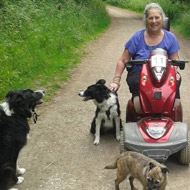Practice launch campaign to help head nurse

Jan has been into work in her wheelchair several times, but will need an adapted car with hand controls to make a full return.
Staff at a Hertfordshire veterinary practice are raising money to help their head nurse return to work following life-saving surgery.
Earlier this year, Jan Collins had to have both of her legs amputated after contracting a life-threatening infection following an operation. The veterinary nurse developed necrotizing fasciitis - more commonly known as the 'flesh eating disease' which can often become a fatal condition resulting in multi-organ failure.
Amazingly, just six months later, Jan is back at home with her beloved collies, Flossie and Star, and learning to walk again on prosthetic limbs.
Now Jan's colleagues at St Johns Veterinary Practice in Berkhamsted have launched a campaign to "Get Jan as mobile as possible", so that she can return to work and continue doing what she loves best.
Vet Beverley Irving said: "Jan has shown the most amazing courage throughout the last few months and is determined to come back to work. Vet nursing has been her life and has been a big incentive in her recovery to get well again and to get back to what she loves doing most - helping animals."
Jan has already been into work in her wheelchair several times, although she is still having daily dressing changes for some her wounds and daily injections into her stomach to prevent further clots developing.
However, because she lives in a village several miles away from the practice, it will not be possible for her to fully return to work unless she is able to find some means of transportation.
Unfortunately the government's scheme to help disabled people become mobile again with hand controlled adapted cars is only available up until the age of 65. Sadly, Jan had her 66th birthday just before the initial operation so, despite returning to work, will not be eligible for any government help.
"I have written to her MP and the Minister for the Disabled but they have confirmed they will not help Jan despite being just a few months older than the outdated current law provides for," said Beverley.
Wanting to help their colleague fulfil her dream of returning to work, the practice decided to set up an online 'pledge' donation website to raise funds.
A statement on the fundraising website says: "As a surgery we would like to raise money to ensure Jan has the mobility equipment she needs, it is now looking most likely that this will be an adapted car."
At the time of publication, just under £1000 had already been raised. Anybody who wishes to make a donation can visit the fundraising site at https://pledgie.com/campaigns/29396.



 The veterinary mental health charity Vetlife is inviting the veterinary community to join it for a sponsored cold-water dip.
The veterinary mental health charity Vetlife is inviting the veterinary community to join it for a sponsored cold-water dip.